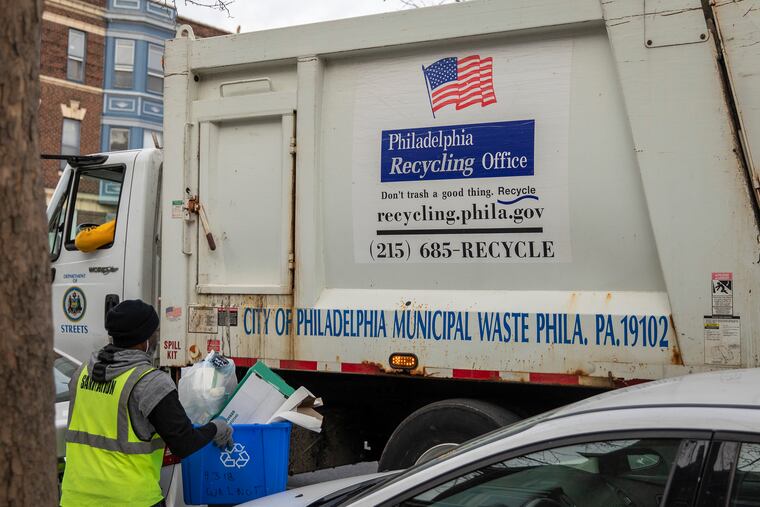Philly to stop incinerating recyclables by the end of the month
Philadelphia will stop the practice of incinerating half its recyclables by the end of the month, an official said.

By the end of the month, Philadelphia says it will stop incinerating half its recyclables — a practice brought on after China stopped taking recycling from the United States.
Scott McGrath, the city’s environmental planner, said Thursday that the Streets Department was close to an agreement with Waste Management to process the city’s recycling at the company’s State Road and Bleigh Avenue facility. There, the recycling will be separated.
Any nonrecyclables will then be taken to Waste Management’s facilities in Falls Township, Bucks County. A small portion of those nonrecyclables might be incinerated, but nothing close to the amount being burned now, McGrath said.
Currently, the city is sending half its recycling pickup to Waste Management and the other half to Covanta’s waste-to-energy plant in Chester, where it is burned.
Under the new contract, all of the recycling will be handled by Waste Management.
“I can’t let out a lot of details until we get everything signed,” McGrath said.
The news should come as a relief to many city residents who were caught by surprise when The Inquirer reported the incineration practice earlier this year.
The cause: China, once the biggest single processor of recycling, said in 2018 that it would no longer take loads of plastic, glass, cardboard, and metals that were more than 0.5 percent contaminated, an almost impossible bar for most municipalities. Philadelphia’s contamination rate ranges from 15 percent to 20 percent. Contamination can mean simply that a pizza box is greasy or that a nonrecyclable plastic bag has been included in a load.
China’s refusal caused a huge ripple through the recycling industry as haulers and municipalities scrambled to find other markets. Recycling contractors separate paper, plastics, metals, and glass, then sell them as a commodity. Ultimately, many could not find buyers for the material, or it was just too contaminated, and prices for disposal jumped.
Philadelphia’s previous recycling contractor, Republic Services, told the city it would charge $170 a ton to continue processing its recycling. Just a few years ago, in 2012, the city had been getting paid $67.35 a ton.
Faced with the price spike, Philadelphia began last fall to split its recycling loads in half as a short-term solution. So loads from neighborhoods with the traditionally cleanest recycling, taken from the Northeast and Northwest, went to Waste Management for processing at $78 a ton.
The rest of the city’s recycling went to Covanta for $63 a ton and it was burned at the company’s plant to generate electricity that went back into the power grid.
McGrath said the practice will end when a short-term contract with Waste Management is signed, which could be as soon as next week.
McGrath expects that, under the new contract, the city will likely pay $90 to $92 a ton.
The city hopes to sign a longer-term contract with the company by July 1, the start of the fiscal year.